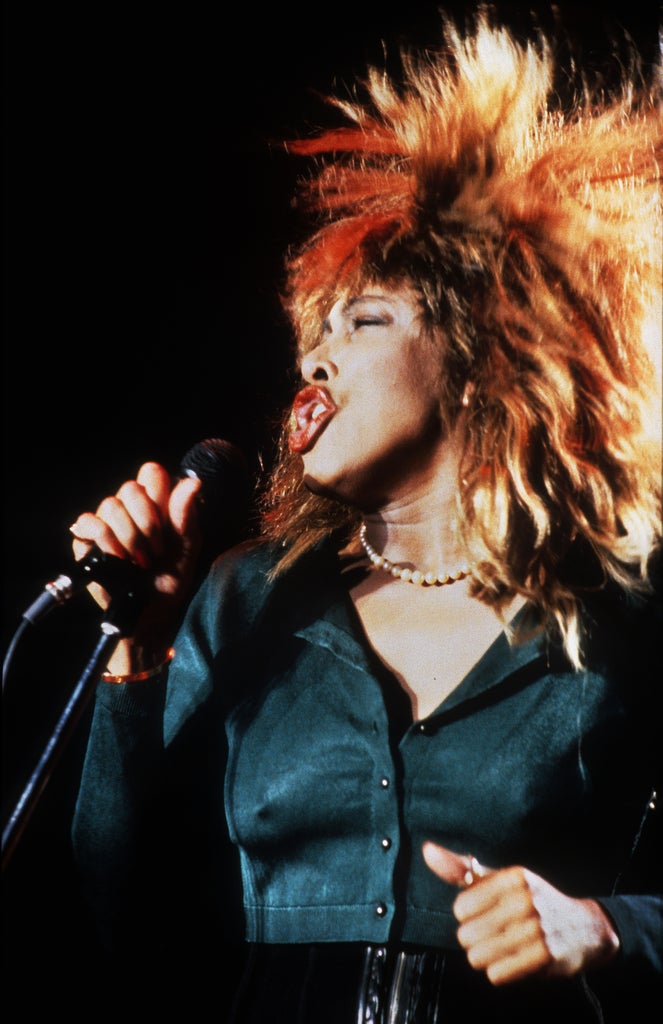
Black women like Sister Rosetta Tharpe, Big Mama Thornton, and Betty Davis were the vocal bibles for rock and roll. These Black women, along with others like The Shirelles and Lavern Baker established the foundation of the genre. Their vocal Blackness and swagger were emulated and duplicated by white rockers of the blues revival in the 1960s like Mick Jagger who wanted the vocality of Blackness without the presence of Black musicians on stage. Their popularity eclipsed the contributions of Black women in rock. Then came Tina Turner, the original disruptor. A patron saint who returned rock to its original home of auditory Blackness.
Born Anna Mae Bullock in 1939 in Brownsville, Tennessee, Tina Turner was raised in Nutbush, a city 50 miles from Memphis. The daughter of sharecroppers, she accompanied her parents in the fields where she spent her early childhood picking cotton. As a young girl, she found solace in her hometown’s church choir. The church remained a constant, while she experienced extreme ups and downs in her life — the separation of her parents, spousal abuse in the home, and death of close family members. When she was 16, she moved to St. Louis to live with her mother. While there, she would frequent the city’s nightlife scene, where she saw the band Kings of Rhythm perform for the first night. On a night in 1957, she took control of the microphone and sang “Darling, You Know I Love You,” a song from her childhood icon B.B. King. Enamoured by her performance, Ike Turner (who would go on to be her abusive husband) hired her to perform alongside the band. It was then that little Anna Mae Bullock started her transformation into Tina Turner.
Turner’s positionality in the musical landscape was unique. She existed in a reality of her own creation; a reality where she witnessed the erasure and appropriation of the Black musical tradition created by her childhood idols. When she entered rock and roll in 1984, it was overseen by a people not of her own. But she was a rocket. She was adamant about a place in the rock and roll tradition, unlike her years performing rhythm and blues with her then abusive husband.
Tina Turner knew her voice had no limitations. It was a tool of liberation and vibration. A tool to connect with the divine. And Turner used her voice to get free.
A man, who despite Tina eclipsing him in every personal and professional way, is still intrinsically linked to her legacy, further strengthening the sadistic bond between survivor and assailant. Although the world champions Turner’s liberation from Ike and heralded her comeback story, the media, press, music and pop culture paid a significant role in the creation of conditions for survivors to be forever linked to their abusers. Regardless of the awards, documentaries, biographies, bestselling books, and inductions into the Rock & Roll Hall of Fame, Tina Turner’s legacy has become interwoven with the violence she endured at the hands of Ike Turner. The failure to defend Tina Turner is a sign of civic neglect.
For Turner, rock was not a place indebted with the gendered degradation, violence, and trauma she experienced in the Ike and Tina years. Turner no longer wanted to wail and lament like Mahalia Jackson and the R&B legends that predeceased her. No, she wanted to rock.
Turner wanted to reclaim the Black musical tradition of rock in her own way and she used the same white musicians who stole from generations of Black musicians to do it. Call it reparations if you must, but Turner knew exactly how to carve an entry into the overtly white, male dominated space of rock and roll. Decades of artistic theft and erasure distanced Black musicians from the rock and roll tradition. While British rockers David Bowie and Joe Cocker hired Black women vocalists to garner a stamp of authenticity to their musical productions, Turner waited.
Yes, she recorded with legendary producer Phil Spector, taught Mick Jagger how to dance, and performed hard rock covers with the Ike and Tina Turner review in England. But, she waited until the right moment to truly make rock music her own.
As a daughter of the Black American South, raised in the Baptist tradition, Turner knew the power of the voice. A voice that could be used to bring down the archangels in a fit of praise. She knew her voice had no limitations. It was a tool of liberation and vibration. A tool to connect with the divine. And Turner used her voice to get free.
Tina Turner’s voice emerged at a time when the tone was not read as “feminine.” Her inherent rawness, grittiness, aggressiveness, and rugged vocal demeanour placed her in perfect alignment with the rockers of that time. Her grit and vocal tenacity not only empowered Turner to go toe to toe with the rockers of the era, but show them how it’s done. It’s often said Turner used rock — a genre that loved Black sound, but not Black people — to distance herself from Blackness. In fact, Little Richard, a close friend of Ike Turner, accused her of leaving her ancestral and musical home.
However, that could not be further than the truth. Her reclamation of rock and roll was a homage to the musicians like Richard, who were pushed to the margins when white musicians came into the spotlight in the 1960s. Her positionality as The Queen of Rock N’ Roll cemented Black women as the originators of this tradition. Her career was the ratification of revisionist music history, which proliferated throughout the music industry. Not only did she bring rock home, she became rock herself.

By Turner freeing rock from the shackles of whiteness, she created an opportunity for Black women musicians like Fefe Dobson, Santigold, Janelle Monae, Brittany Howard, Lizzo and Beyoncé to flow throughout the once racially segregated genres. On Turner’s 80th birthday, Beyoncé spoke about Turner’s impact, “To my Queen Tina Turner. I have loved you for a lifetime. You have paved the way and made it possible for another country girl to go after her dreams. Im [sic] so grateful for you. I am blessed to have two Tinas showing me the way…”
Turner broke the glass ceiling of Black women’s artistry and musicality that was solely categorised as R&B or pop. Black women could be rock stars because Tina Turner said so. Black women could be country singers. Black women could show up as fully whole beings because Turner herself had the courage to do so.
However, Turner’s ferocity came at a price. By being fearless in sharing the experience of her abuse, she became a punchline in pop culture. The same racialised and gendered stereotypes Tina used rock to evade were used to make fun of her. From The Notorious B.I.G. usage of her assault in 1994’s Machine Gun Funk, (“That’s why I pack a nina, fuck a misdemeanor, Beatin’ motherfuckers like Ike beat Tina) to Jay Z’s mention of spousal assault in 2013’s Drunk In Love (“I’m Ike Turner, turn up, baby, no, I don’t play, Now eat the cake, Anna Mae/ Eat the cake, Anna Mae!”), Tina Turner’s abuse became these rappers’ twisted delights.
Instead of being celebrated, Turner’s story of survival was used as fodder to exemplify the music industry’s insidious practice of misogyny and misogynoir. Although Turner had reclaimed her sensuality and sexuality, as well as her autonomy of self, her reclamation was used as an example of why she deserved to endure abuse. Now, it’s impossible to dissect Turner’s legacy without also exposing the systems that continued to oppress her, long after her marriage.
Turner’s most revolutionary act was to choose herself. Turner taught Black women, especially Black women survivors to choose themselves first.
Decades later, the same tropes are still used to justify the abuse endured by Black women in music like Megan Thee Stallion. Turner was one of the first Black women to come forward as a survivor of abuse and violence. Unfortunately, her coming out story set a dangerous precedent in the way how Black women, especially Black women survivors, are criticised, disbelieved and harassed in the media.
Around the time of What’s Love Got to Do with It, the Academy Award-nominated biopic released in 1993, Turner expressed her frustration with the barrage of questions posed by the press about her abusive marriage. She told Vanity Fair: “It’s like going back into time, when you are trying to understand how prehistoric people lived. I am saying it one last time, and I hope people don’t even think about talking to me about it anymore. If they don’t understand, fine.”
Throughout all of this, Turner’s most revolutionary act was to choose herself. Turner taught Black women, especially Black women survivors to choose themselves first. Over the years, she developed and maintained her boundaries, and prioritised her health and well-being over anything else. She not only became the blueprint for Black women in music, but Black women overall who were educated and socialised to put themselves last. If Tina Turner put herself first, so could we.

Turner always had faith that she would return back to herself over and over again. “After I began practising Buddhism, I realised that my hardships could give me a mission—a purpose. I saw that by overcoming my obstacles, I could build indestructible happiness and inspire others to do the same,” said Turner in a 2021 interview with the Harvard Business Review. “Then I could see everything that came my way, both the highs and the lows, as an opportunity for self-improvement and for sparking hope in others.” Turner was a woman of faith and a self-described Buddhist-Baptist who believed in the natural and divine order of the ebbs and flows of life.
Her sentiments are reminiscent of Psalm 30:5: “weeping may endure for a night, but joy comes in the morning.” Turner always knew the pain — whether it was inflicted by Ike, the mistreatment and harassment in the media and the press, or her own personal vices — would flee from her.
She credits the chanting of “Nam-myoho-renge-kyo,” a Buddhist mantra, with her change of mindset. In 2021, she described the experience to TODAY: “Chanting helped me to go within myself and open deep sources of happiness and wisdom in my own heart and mind. Soon, I realised that I already had within my everything I needed to change my circumstances and create a truly happy life. We all have that, and I want everyone to know it.” She always found a way to transmute the energy of pain and suffering into joy. And that is the legacy Tina Turner leaves us with, one of revelatory pain and liberatory joy.
As a Black woman from The South, Turner’s gift of alchemy will always mesmerise me. In every season of her life, she reclaimed herself. Her country self. Her child self. The selves that she was taught and socialised to hate, she engulfed them in a warm embrace. The testimony of her life is to always make peace with the versions of ourselves that we hate, so we can live to embrace ourselves in full integrity. I thank Turner for being the alchemist, a woman from the rural South who conjured the world in her glamour, beauty, and grace. Here’s to the little Black girl from Tennessee who changed the whole world. May God be good to Tina Turner on this journey and the next.
Like what you see? How about some more R29 goodness, right here?
10 Decades Of Black Rock With Grace Gibson